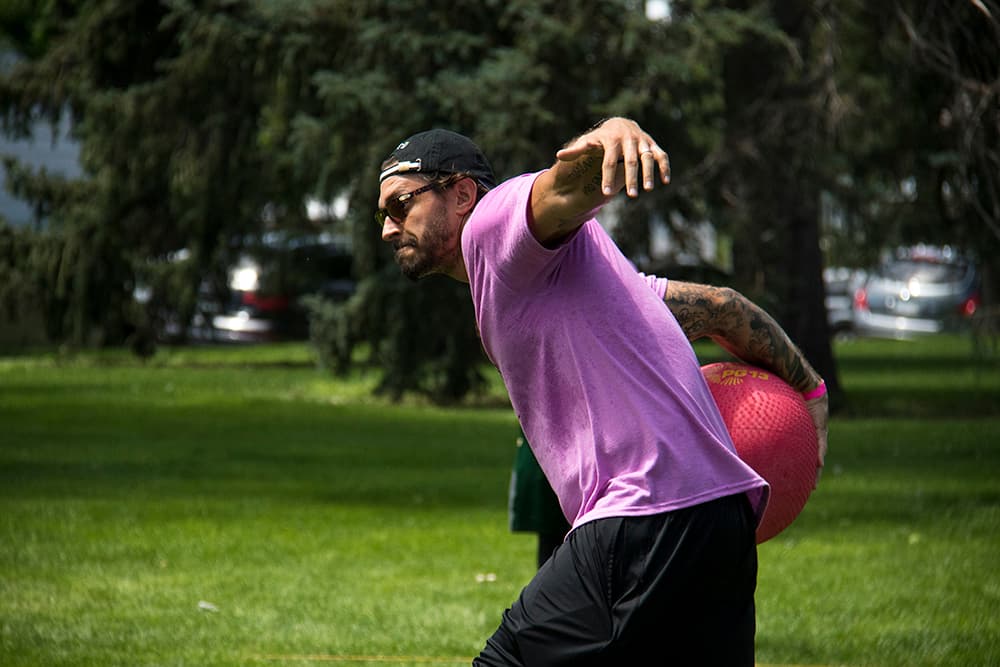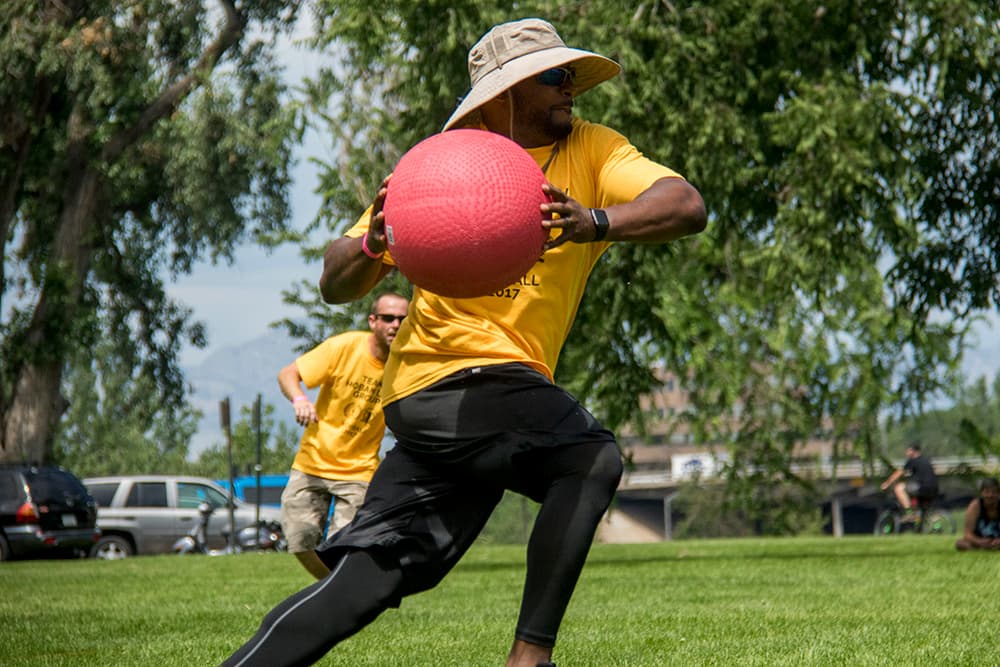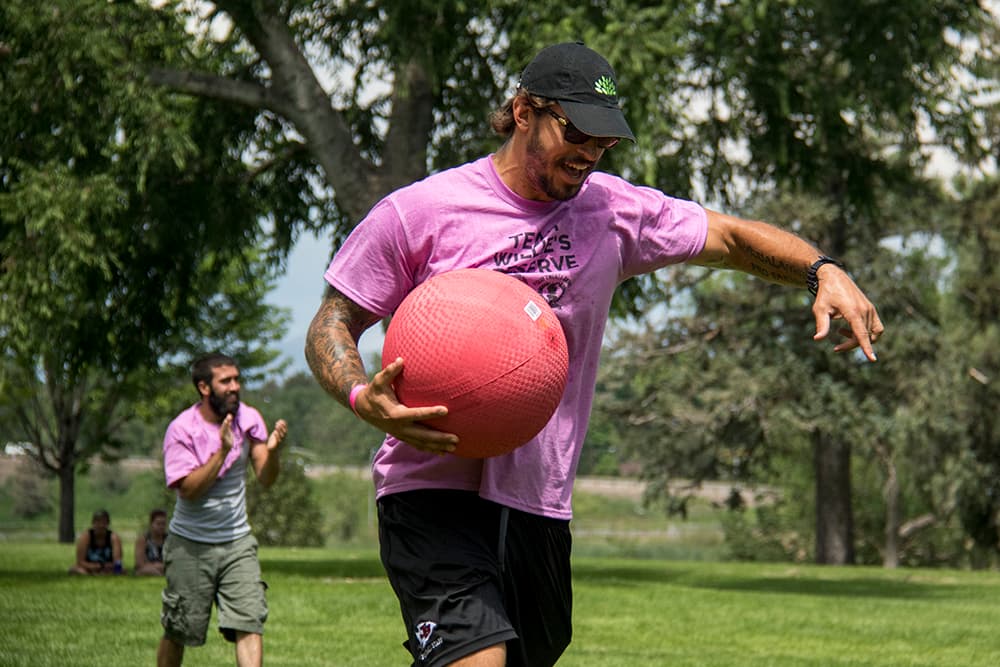
A former NFL offensive lineman and ex-Broncos running back were pitted against each other on Saturday in Berkeley Park — in a friendly game of kickball.
Eben Britton, who played six seasons of professional football from 2009-14, and Tatum Bell, who played for the Broncos from 2004-08, were there as a part of the 420 Games. The 420 Games, which featured a 4.2-mile race, a kickball tournament and the chance to interact with cannabis vendors, were put on by founder Jim McAlpine as a way to spread the word that cannabis and an active lifestyle can go hand-in-hand.
For Britton, Bell and a handful of other ex-pro athletes in attendance, the 420 Games also represented a chance to share their experiences of using cannabis to successfully treat pain — and why they believe cannabis products are a safer alternative compared to anti-inflammatories or opioids.
"Those things just made me feel insane."
In 2010, Britton was playing for the Jacksonville Jaguars when he suffered a dislocated shoulder and torn labrum against the Kansas City Chiefs in Week 7. Britton underwent surgery and was prescribed Vicodin to go along with two other anti-inflammatories. Soon after taking them, Britton began having trouble sleeping and noticed himself becoming more irritable.
"Those things just made me feel insane," Britton said. "I was mad — on a hair trigger with my rage. I was waking up at 2, 3 o’clock in the morning needing to take more pills. That’s what you call withdrawal symptoms. A knife twisting through my gut — that is what opioids do to you."
Britton felt rage "right at the surface." He would snap at his wife, Brittany, or his mom over little things. Britton missed the Jaguars' final nine games of the season while he was recovering. During that time, he turned more and more to cannabis, discovering it could help him manage the pain without leaving him feeling so angry.
"I started at that time because I’d already done my annual drug test," Britton said. "I was just like, ‘Man, this makes me feel better than those pills do. This doesn’t make me feel this discomfort, that unintelligible discomfort that you feel throughout your body.' It was sort of intuitive that I just kept coming back to that."
Britton worked his way back from the shoulder injury. But during training camp in 2011, he began to feel back pain. Britton had trouble staying on the field for more than three plays at a time. There were times when he couldn't feel his right leg. He underwent surgery to repair a herniated disc.
"They would just give him epidural after epidural," Brittany Britton said. "And Vicodin. Just covering up the pain."
The back pain persisted throughout the season. Eventually, Britton found out he'd suffered an infection in the disc following surgery. Britton was hospitalized later that year while his wife was eight months pregnant. He was once again prescribed Vicodin.
"He was not really sleeping," Brittany Britton said. "Maybe more moody. And not really engaged in family life, to be honest. It makes you irritable."
"These pills were just making me crazy," Eben Britton said. "I realized that, 'Oh, cannabis. I can relax. I can take a deep breath. My body decompresses.' That was really the beginning of this whole thing."
Britton's pro football career came to an end in 2014. After it was over, he completely weaned himself off prescription painkillers and began relying only on cannabis products. Britton went on to co-found a company called BeTru Organics, which produces a line of pain-relieving creams, sprays and gummies that contain hemp extracts. Their products do not contain tetrahydrocannabinol — or THC — the chemical found in marijuana that causes a psychoactive high.
Cannabis is still given Schedule I status by the DEA, meaning that it has no "currently accepted medical use and a high potential for abuse." But several studies — including one published by the National Academies of Sciences, Engineering, and Medicine in January — found evidence that cannabis is an effective pain reliever.

"I was medicating the whole time I was playing."
Marijuana remains on the NFL's banned substance list — even if it isn't much of a secret that NFL players have long relied on it as a way to treat pain.
"I was medicating the whole time I was playing," said Bell, who racked up 2,773 rushing yards and 16 touchdowns across five seasons. "That was my alternative anyway. Especially after games.
"I used to take pills when I was playing. They try to stuff them down your throat. Anti-inflammatories, that’s all it was. And the alternative can be cannabis. You don’t have to smoke it. But you’ve got edibles, creams — all kind of avenues that can work for you."
Bell lives in Centennial with his wife and three kids. He still experiences aches and pains that date back to his pro football days. He likes to treat them with a cream that contains a hemp extract.
"I ache all the time," Bell said. "I put some on before I came out here. I live and die by it. Every day."
Current NFL players who test positive for THC can face suspension and fines. But attitudes about marijuana and cannabis products appear to be shifting.
Last November, Ian Rapaport of the NFL Network reported that the NFL Player's Association had formed a task force to study pain management. One of the areas they reportedly looked at was cannabis' potential as a pain reliever.
An ESPN poll last fall indicated that a majority of NFL players feel that taking cannabis off the league's banned substance list would reduce the amount of chemical painkillers players use. ESPN anonymously polled 226 players, and 61 percent of them said they felt players would be less dependent of pain-killing shots if cannabis were legal.
Even some in the NFL's old guards such as Dallas Cowboys owner Jerry Jones reportedly believe the NFL should reexamine its marijuana policy. At an owner's meeting this spring, Jones allegedly told his fellow owners that he wants the NFL to drop its prohibition on marijuana.
"It’s helped me heal," Britton said. "It's helped my body heal after football. It’s helped me re-identify myself as a man and human being after sports."

Subscribe to Denverite’s weekly sports newsletter here.












